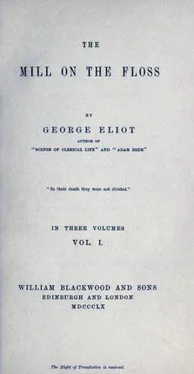And thus every direction in which Dr. Kenn had turned, in the hope of procuring some kind recognition and some employment for Maggie, proved a disappointment to him. Mrs. James Torry could not think of taking Maggie as a nursery governess, even temporarily, — a young woman about whom "such things had been said," and about whom "gentlemen joked"; and Miss Kirke, who had a spinal complaint, and wanted a reader and companion, felt quite sure that Maggie's mind must be of a quality with which she, for her part, could not risk any contact. Why did not Miss Tulliver accept the shelter offered her by her aunt Glegg? It did not become a girl like her to refuse it. Or else, why did she not go out of the neighborhood, and get a situation where she was not known? (It was not, apparently, of so much importance that she should carry her dangerous tendencies into strange families unknown at St. Ogg's.) She must be very bold and hardened to wish to stay in a parish where she was so much stared at and whispered about.
Dr. Kenn, having great natural firmness, began, in the presence of this opposition, as every firm man would have done, to contract a certain strength of determination over and above what would have been called forth by the end in view. He himself wanted a daily governess for his younger children; and though he had hesitated in the first instance to offer this position to Maggie, the resolution to protest with the utmost force of his personal and priestly character against her being crushed and driven away by slander, was now decisive. Maggie gratefully accepted an employment that gave her duties as well as a support; her days would be filled now, and solitary evenings would be a welcome rest. She no longer needed the sacrifice her mother made in staying with her, and Mrs. Tulliver was persuaded to go back to the Mill.
But now it began to be discovered that Dr. Kenn, exemplary as he had hitherto appeared, had his crotchets, possibly his weaknesses. The masculine mind of St. Ogg's smiled pleasantly, and did not wonder that Kenn liked to see a fine pair of eyes daily, or that he was inclined to take so lenient a view of the past; the feminine mind, regarded at that period as less powerful, took a more melancholy view of the case. If Dr. Kenn should be beguiled into marrying that Miss Tulliver! It was not safe to be too confident, even about the best of men; an apostle had fallen, and wept bitterly afterwards; and though Peter's denial was not a close precedent, his repentance was likely to be.
Maggie had not taken her daily walks to the Rectory for many weeks, before the dreadful possibility of her some time or other becoming the Rector's wife had been talked of so often in confidence, that ladies were beginning to discuss how they should behave to her in that position. For Dr. Kenn, it had been understood, had sat in the schoolroom half an hour one morning, when Miss Tulliver was giving her lessons, — nay, he had sat there every morning; he had once walked home with her, — he almost always walked home with her, — and if not, he went to see her in the evening. What an artful creature she was! What a mother for those children! It was enough to make poor Mrs. Kenn turn in her grave, that they should be put under the care of this girl only a few weeks after her death. Would he be so lost to propriety as to marry her before the year was out? The masculine mind was sarcastic, and thought not.
The Miss Guests saw an alleviation to the sorrow of witnessing a folly in their Rector; at least their brother would be safe; and their knowledge of Stephen's tenacity was a constant ground of alarm to them, lest he should come back and marry Maggie. They were not among those who disbelieved their brother's letter; but they had no confidence in Maggie's adherence to her renunciation of him; they suspected that she had shrunk rather from the elopement than from the marriage, and that she lingered in St. Ogg's, relying on his return to her. They had always thought her disagreeable; they now thought her artful and proud; having quite as good grounds for that judgment as you and I probably have for many strong opinions of the same kind. Formerly they had not altogether delighted in the contemplated match with Lucy, but now their dread of a marriage between Stephen and Maggie added its momentum to their genuine pity and indignation on behalf of the gentle forsaken girl, in making them desire that he should return to her. As soon as Lucy was able to leave home, she was to seek relief from the oppressive heat of this August by going to the coast with the Miss Guests; and it was in their plans that Stephen should be induced to join them. On the very first hint of gossip concerning Maggie and Dr. Kenn, the report was conveyed in Miss Guest's letter to her brother.
Maggie had frequent tidings through her mother, or aunt Glegg, or Dr. Kenn, of Lucy's gradual progress toward recovery, and her thoughts tended continually toward her uncle Deane's house; she hungered for an interview with Lucy, if it were only for five minutes, to utter a word of penitence, to be assured by Lucy's own eyes and lips that she did not believe in the willing treachery of those whom she had loved and trusted. But she knew that even if her uncle's indignation had not closed his house against her, the agitation of such an interview would have been forbidden to Lucy. Only to have seen her without speaking would have been some relief; for Maggie was haunted by a face cruel in its very gentleness; a face that had been turned on hers with glad, sweet looks of trust and love from the twilight time of memory; changed now to a sad and weary face by a first heart-stroke. And as the days passed on, that pale image became more and more distinct; the picture grew and grew into more speaking definiteness under the avenging hand of remorse; the soft hazel eyes, in their look of pain, were bent forever on Maggie, and pierced her the more because she could see no anger in them. But Lucy was not yet able to go to church, or any place where Maggie could see her; and even the hope of that departed, when the news was told her by aunt Glegg, that Lucy was really going away in a few days to Scarborough with the Miss Guests, who had been heard to say that they expected their brother to meet them there.
Only those who have known what hardest inward conflict is, can know what Maggie felt as she sat in her loneliness the evening after hearing that news from Mrs. Glegg, — only those who have known what it is to dread their own selfish desires as the watching mother would dread the sleeping-potion that was to still her own pain.
She sat without candle in the twilight, with the window wide open toward the river; the sense of oppressive heat adding itself undistinguishably to the burthen of her lot. Seated on a chair against the window, with her arm on the windowsill she was looking blankly at the flowing river, swift with the backward-rushing tide, struggling to see still the sweet face in its unreproaching sadness, that seemed now from moment to moment to sink away and be hidden behind a form that thrust itself between, and made darkness. Hearing the door open, she thought Mrs. Jakin was coming in with her supper, as usual; and with that repugnance to trivial speech which comes with languor and wretchedness, she shrank from turning round and saying she wanted nothing; good little Mrs. Jakin would be sure to make some well-meant remarks. But the next moment, without her having discerned the sound of a footstep, she felt a light hand on her shoulder, and heard a voice close to her saying, "Maggie!"
The face was there, — changed, but all the sweeter; the hazel eyes were there, with their heart-piercing tenderness.
"Maggie!" the soft voice said. "Lucy!" answered a voice with a sharp ring of anguish in it; and Lucy threw her arms round Maggie's neck, and leaned her pale cheek against the burning brow.
Читать дальше












